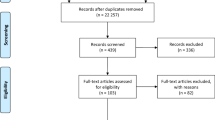Abstract
Purpose
Vitamin A and its derivatives positively influence the differentiation of epithelia and other tissues and prevent the proliferation of preneoplastic and neoplastic cells. Vitamin A is therefore taken into account as a potential supporting factor in cancer therapy.
Methods
In November 2020, a systematic search was conducted searching five electronic databases (EMBASE, Cochrane, PsycINFO, CINAHL and Medline) to find studies looking at the effects of using vitamin A as a complementary therapy for cancer patients. From all 12,823 search results, 9 publications referring to 9 studies with 4296 patients were included in this systematic review.
Results
The patients treated with vitamin A were diagnosed with various cancers and stages. Outcome variables were overall survival of cancer, progression-free survival, occurrence of second primary tumours and recurrences, improvement of chronic radiation-induced proctopathy and side effects of vitamin A. For the most part, the studies had a limited methodological quality. In summary, it can be said that due to the methodological deficiencies of the studies, no concrete statement can be made regarding the prolongation of overall survival and progression-free survival. There is also no evidence of the benefit of vitamin A in the treatment of chronic radiation-induced proctopathy, which can be attributed to methodological deficiencies in the study, as well. In the studies that report on side effects, it becomes clear that side effects, such as mucocutaneous symptoms, temporary increase in liver enzymes and gastrointestinal side effects occur more frequently in the group with vitamin A intervention.
Conclusion
The limited interpretability of the results due to the methodological deficiencies of the included studies does not allow a final statement on the benefits of vitamin A as a complementary treatment for cancer patients.

Similar content being viewed by others
References
Ehrenpreis ED et al (2005) A prospective, randomized, double-blind, placebo-controlled trial of retinol palmitate (vitamin A) for symptomatic chronic radiation proctopathy. Dis Colon Rectum 48(1):1–8
Guidelines (2022) https://www.leitlinienprogramm-onkologie.de/english-language/.
Huebner J, Micke O, Mücke R, Büntzel J, Prott FJ, Kleeberg UR, Davey B, Senf B, Muenstedt K (2014) User rate of complementary and alternative medicine (CAM) of patients visiting a counseling facility for CAM of a German Comprehensive Cancer Center. Anticancer Res 34:943–948
Jung AY, Cai X, Thoene J, Obi N, Jaskulski S, Behrens S, Flesch-Janys D, Chang-Claude J (2019) Antioxidant supplementation and breast cancer prognosis inpostmenopausal women undergoing chemotherapy and radiationtherapy. Am J Clin Nutr 109:69–78
Jyothirmayi R et al (1996) Efficacy of vitamin A in the prevention of loco-regional recurrence and second primaries in head and neck cancer. Eur J Cancer B Oral Oncol 32(6):373–376
Lotan R (1980) Effects of vitamin A and its analogs (retinoids) on normal and neoplastic cells. Biochimica Et Biophysica Acta-Rev Cancer 605(1):33–91
Margalit DN et al (2012) Beta-carotene antioxidant use during radiation therapy and prostate cancer outcome in the Physicians’ Health Study. Int J Radiat Oncol Biol Phys 83(1):28–32
Mayne ST et al (2001) Randomized trial of supplemental beta-carotene to prevent second head and neck cancer. Cancer Res 61(4):1457–1463
Meyskens FL Jr et al (1994) Randomized trial of vitamin A versus observation as adjuvant therapy in high-risk primary malignant melanoma: a Southwest oncology group study. J Clin Oncol: off J Amer Soc Clin Oncol 12(10):2060–2065
Meyskens FL Jr et al (1995) Effects of vitamin A on survival in patients with chronic myelogenous leukemia: a SWOG randomized trial. Leuk Res 19(9):605–612
Micke O, Bruns F, Glatzel M, Schönekaes K, Micke P, Mücke R, Büntzel J (2009) Predictive factors for the use of complementary and alternative medicine (CAM) in radiation oncology. Eur J Integr Med 1:22–30
Pastorino U et al (1993) Adjuvant treatment of stage I lung cancer with high-dose vitamin A. J Clin Oncol: off J Amer Soc Clin Oncol 11(7):1216–1222
SIGN Checkliste (2022) https://www.sign.ac.uk/what-we-do/methodology/checklists/.
Sporn MB, Newton DL (1979) Chemoprevention of cancer with retinoids. Fed Proc 38(11):2528–2534
Toma S et al (2003) beta-carotene supplementation in patients radically treated for stage I-II head and neck cancer: results of a randomized trial. Oncol Rep 10(6):1895–1901
van Zandwijk N et al (2000) EUROSCAN, a randomized trial of vitamin A and N-acetylcysteine in patients with head and neck cancer or lung cancer. J Natl Cancer Inst 92(12):977–986
Funding
The work of JD, SK and MF was funded in parts (search of the literature, title-abstract screening) by the German Guideline “S3 Leitlinie Komplementärmedizin in der Behandlung von onkologischen PatientInnen (Registernummer 032–055OL)” funded by the German Cancer Aid (Fördernummer 11583) within the German Guideline Program in Oncology.
Author information
Authors and Affiliations
Contributions
All authors contributed to the study conception and design. Material preparation, data collection and analysis were performed by TR, JD, SK, MF and JH. The first draft of the manuscript was written by TR and all authors commented on previous versions of the manuscript. All authors read and approved the final manuscript.
Corresponding author
Ethics declarations
Competing interests
The authors declare no competing interests.
Conflict of interest
The authors declare no conflict of interest. The authors have no relevant financial or non-financial interests to disclose.
Additional information
Publisher's Note
Springer Nature remains neutral with regard to jurisdictional claims in published maps and institutional affiliations.
Rights and permissions
Springer Nature or its licensor holds exclusive rights to this article under a publishing agreement with the author(s) or other rightsholder(s); author self-archiving of the accepted manuscript version of this article is solely governed by the terms of such publishing agreement and applicable law.
About this article
Cite this article
Retzlaff, T., Dörfler, J., Kutschan, S. et al. The benefits of vitamin A as a complementary treatment for oncology patients: a systematic review. J Cancer Res Clin Oncol 149, 2157–2177 (2023). https://doi.org/10.1007/s00432-022-04224-6
Received:
Accepted:
Published:
Issue Date:
DOI: https://doi.org/10.1007/s00432-022-04224-6




